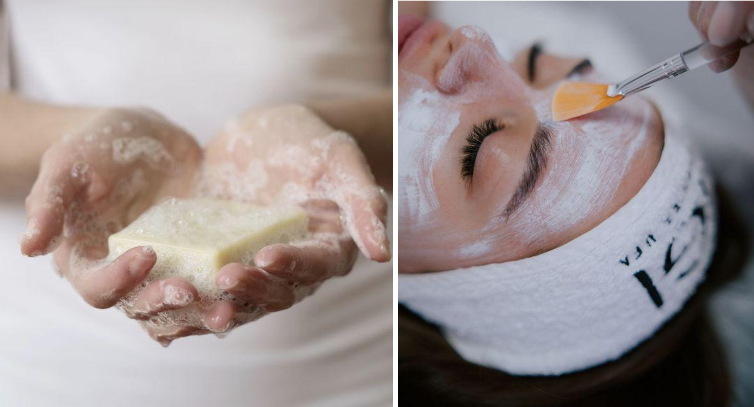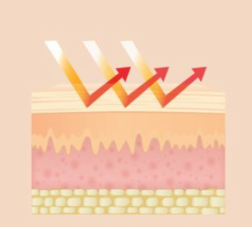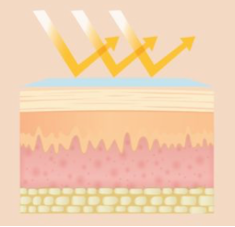Is Less More in Skincare?
When Minimalist Skincare become a trend
Skincare or bed? This is undoubtedly the nightly dilemma for every lazy person before sleep.

Source: https://www.pinterest.com (Pinterest)
Want to enhance your look but are held back by time, energy, and method? As work and life pressures increase from day to day, people are losing enthusiasm for complex and costly beauty and skincare routines. Watching the expiration dates of expensive high-end skincare products creep closer, many have felt the anxiety of wasted investment.
In recent years, various studies have shown that people are shifting toward simplifying their daily skincare rather than relying on elaborate routines and multiple products. The focus is now on making skincare more efficient, gentle, and straightforward. With growing awareness of health and environmental issues, consumers increasingly advocate for natural, non-irritating, and low-cost skincare solutions. Thus, minimalist skincare has gradually become the preferred choice for many.
The 2024 Minimalist Skincare White Paper, released this year, highlights that the core of minimalist skincare lies in prioritizing safety, scientific approaches, and products that are both effective and comfortable. This skincare philosophy is particularly beneficial for sensitive skin, acne-prone skin, imbalanced skin, and skin with a weakened barrier. By eliminating unnecessary functional products, consumers focus on the basics of skincare—cleansing, moisturizing, and sun protection.
According to this concept, minimalist skincare aims to reduce the skin’s burden and minimize allergens, making choosing beauty products particularly important. To avoid blindly following trends and purchasing unsuitable products that lead to waste and potential skin damage, consumers need to understand their skin type and specific issues before selecting products. It’s crucial to choose a skincare regimen that meets individual needs and to examine whether the key ingredients in chosen products are safe and effective for addressing personal skin concerns. Common skin types are dry, oily, combination-oily, and sensitive. Testing allows consumers to gain deeper insights into their skin and select the most suitable skincare products. In daily skin care, it’s essential to prioritise high-quality basic products and use targeted, effective treatments for specific skin issues to avoid the burden or sensitivity caused by overskincare.
Minimalist skincare has gained popularity as young consumers reflect on the ineffectiveness and overuse of skincare routines. This trend aligns with the demands of a fast-paced, high-stress era. Under the shadow of unhealthy lifestyles and concerns over product safety, consumers often feel overwhelmed and anxious when faced with an array of options on the market. As a result, safer, gentler beauty products have become the intuitive choice.
Minimalist skincare, the best way for sensitive skin?
Generally, sensitive skin is characterized by redness on the cheeks, itching, dryness, tightness, or a tendency to react allergically to cosmetic products. These symptoms may worsen, especially when exposed to hot sunlight, as ultraviolet (UV) rays are one of the main causes of skin barrier damage, further reducing the skin’s tolerance. Therefore, for individuals with sensitive skin, sun protection is essential. However, many sunscreen products on the market, such as sunscreens and sprays, often contain various chemical ingredients and film-forming agents, which can make the product texture heavy and greasy, not ideal for sensitive skin. These products may even have the opposite effect, leading to severe allergic reactions to chemical sunscreens. Therefore, for sun protection, individuals with sensitive skin should prioritize physical sunscreens.

The sunscreen priority for sensitive skin should be:
Sun protection gear (e.g., hats, umbrellas, sunglasses) >Physical sunscreen >Chemical sunscreen

Chemical Sunscreen

Physical Sunscreen
When choosing functional skincare products, individuals with sensitive skin should avoid various serums and harsh exfoliating products available on the market. Sensitive skin often has a fragile barrier, and exfoliating can cause friction on the skin’s surface, making the skin even more sensitive. Moreover, serums tend to contain complex ingredients that can overwhelm the skin. In addition, products containing alcohol and fragrances are not suitable for sensitive skin, as these ingredients can be irritating and worsen allergic reactions. Fragrance is also a common allergen that can cause skin irritation or redness. Finally, skincare products containing irritating preservatives should also be avoided, as they can cause discomfort on the skin for the same reasons.
This is the “reduction” approach to skincare that individuals with sensitive skin should adopt. So, what types of skincare products should they choose?
First, for facial cleansing, a gentle amino acid-based cleanser is a good option for those with sensitive skin, as it is mild and non-irritating, preventing over-cleansing. For functional products, barrier-repairing products should be the first choice for sensitive skin. Products containing soothing ingredients such as centella asiatica extract, glycyrrhizic acid, and panthenol can effectively help calm the discomfort of sensitive skin and achieve anti-inflammatory and calming effects. Secondly, moisturizing the skin is also crucial. Choosing products containing moisturizing ingredients like hyaluronic acid and glycerin can effectively lock in moisture, maintain skin hydration, and enhance the skin’s barrier protection.
The above examples present the importance and specific methods of simplifying skincare for individuals with sensitive skin. By optimizing cleansing, focusing on barrier repair, and enhancing moisturizing steps, people can effectively reduce the burden on their skin and avoid the potential harm caused by excessive use of functional products. This “reduction skincare” approach not only helps alleviate skin sensitivity issues but also reflects a more scientific and rational approach to skincare.
Conclusion
In conclusion, the popularity of minimalist skincare stems from young consumers’ reflections on ineffective and overcomplicated skincare routines, aligning with the demands of this fast-paced and high-pressure era. For individuals with sensitive skin, we can see the necessity of opting for simple and effective skincare solutions when faced with complex product choices. This is not only true for sensitive skin, but also for the general public, who, under the influence of long-term unhealthy habits and concerns about product safety, often feel confused and anxious when confronted with the wide variety of products available on the market. As a result, safer and gentler beauty products have become the subconscious choice for many.
Want to Stay Updated on the Latest Beauty Industry Trends?
The International Beauty Expo (IBE) is making its grand return in June 2025 in Kuala Lumpur, Malaysia! Bringing together exhibitors from around the world, the event will showcase cutting-edge beauty products, technologies, and trends. It’s the perfect platform for industry professionals and beauty enthusiasts to exchange ideas and explore opportunities.
Stay tuned for more details on our website: https://ibe.my
